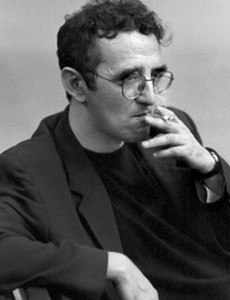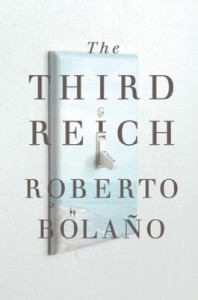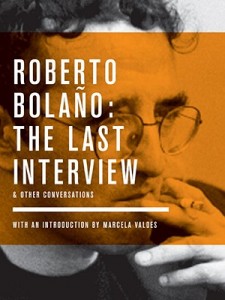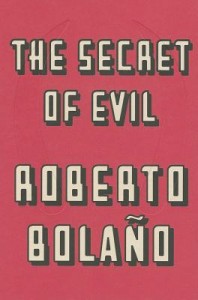 So you’ve got a dreadful first novel stashed somewhere in the proverbial drawer. You can’t bear to foist it on one more friend, but you can’t bear to burn it, either, or delete that outdated .doc file, because you know there’s something worthwhile amid the disaster. Take heart, dear writer. Roberto Bolaño will show you the way.
So you’ve got a dreadful first novel stashed somewhere in the proverbial drawer. You can’t bear to foist it on one more friend, but you can’t bear to burn it, either, or delete that outdated .doc file, because you know there’s something worthwhile amid the disaster. Take heart, dear writer. Roberto Bolaño will show you the way.
Following the global success of his posthumous blockbuster 2666, the Chilean author’s own rescued drawer novel emerged last year to the full red carpet treatment, with a rare serialization in The Paris Review, followed by a Farrar, Straus and Giroux hardcover release. Calm that initial rush of jealousy, friend, because The Third Reich is not a very good book. Bolaño’s neurotic narrator is a bit of a drip, the meandering plot described by his journal entries squanders the author’s genius for atmospheric tension, and the flat ending’s emotional impact is thin at best. You can read it if you’re a diehard Bolañero seeking a glimpse of his talents in the rough, or you can read it as a guide to finding the diamonds buried in your own drawer novel: The Third Reich, it turns out, is a very longwinded first draft of arguably Bolaño’s greatest short story, “Last Evenings on Earth,” and reading the two works side by side provides a clinic on how we too might pare our overworked drawer novels down to their most urgent desires.
A caveat: Bolaño died in 2003 and can no longer illuminate his process here. The backstory, however, leaves plenty of room for supposition. The Paris Review’s introduction notes that while Bolaño’s standard biography has the struggling poet taking up fiction in the mid-1990s to provide for his family, The Third Reich’s original manuscript dates back to 1989, the year before his first child was born. When Bolaño bought his first computer in 1995, he apparently went back and re-typed the novel’s first sixty pages in digital format. The Paris Review’s editors argue this “suggests that he wished to see it published during his lifetime,” but coyly add that it’s “anyone’s guess” why he did not.
I submit that Bolaño fudged the date of his switch to fiction in order to gently bury his earliest efforts, and that he quit retyping The Third Reich after only sixty pages because he figured out what he’d done wrong. I imagine Bolaño leaning back in his chair at his home in Blanes, on Spain’s Costa Brava, on a warm day in 1995. He lights one of his beloved cigarettes and stares at the screen as the solutions to his novel’s problems come in waves. The smoke drifts out an open window. Ahora, Bolaño says, Ya lo se. He hits control-S to save, opens a new document, and starts “Last Evenings on Earth,” the masterpiece that would ultimately anchor both his 1997 debut collection Llamadas telefonicas and his first collection of stories in English translation, Last Evenings on Earth, published in 2006.
The novel and the short story, in two quick sketches: In The Third Reich a young German man named Udo Berger goes on a doomed holiday to the cost of Spain with his soon-to-be estranged girlfriend. Instead of enjoying the beach, however, Udo spends his days shut in the hotel playing a board-game reenactment of World War II. At night he and his girlfriend haunt a series of local dives, and the trip gradually turns weird and dark. In “Last Evenings on Earth,” a young Chilean man known as B goes on a doomed holiday to Acapulco with his already somewhat estranged father. B spends much of the trip reading about a French surrealist poet who disappeared while fleeing the Nazis. One night B and his father visit a local dive bar, and things quickly turn weird and dark.
 So why does “Last Evenings on Earth” endure as one of “the greatest things Bolaño ever wrote,” according to Giles Harvey, in the New Yorker, while The Third Reich, despite its flashes of promise, reads like a rookie author trying on an ill-fitting suit in front of a mirror? An obvious starting point is the compression of voice and plot that occurs in the move from novel to short story. The Third Reich is told through Udo’s journal, which records a month of bad nights from the safe remove of the bleary mornings after. However, any dramatic tension those bad nights might build is drowned out by the work Bolaño is doing to establish Udo’s isolating arrogance: Udo declines to dance or chat or fight in the night clubs, explaining pedantically that he prefers to “meditate on the unknown fates of the amorphous masses and shadowy faces that surround me.” The lesson here: stories told completely inside the vacuum-seal of the narrator’s head will suffocate without an outside force to rip through the plastic. The Third Reich is dull because Udo’s all alone on the page, no matter what happens or who appears. Spoiler alert: Udo loses a weeks-long war game to El Quemado, a disfigured local paddleboat renter, but El Quemado barely utters a peep. There’s also a drowning and a rape, but the novel reaches its purported climax only when Udo simply packs up and goes home.
So why does “Last Evenings on Earth” endure as one of “the greatest things Bolaño ever wrote,” according to Giles Harvey, in the New Yorker, while The Third Reich, despite its flashes of promise, reads like a rookie author trying on an ill-fitting suit in front of a mirror? An obvious starting point is the compression of voice and plot that occurs in the move from novel to short story. The Third Reich is told through Udo’s journal, which records a month of bad nights from the safe remove of the bleary mornings after. However, any dramatic tension those bad nights might build is drowned out by the work Bolaño is doing to establish Udo’s isolating arrogance: Udo declines to dance or chat or fight in the night clubs, explaining pedantically that he prefers to “meditate on the unknown fates of the amorphous masses and shadowy faces that surround me.” The lesson here: stories told completely inside the vacuum-seal of the narrator’s head will suffocate without an outside force to rip through the plastic. The Third Reich is dull because Udo’s all alone on the page, no matter what happens or who appears. Spoiler alert: Udo loses a weeks-long war game to El Quemado, a disfigured local paddleboat renter, but El Quemado barely utters a peep. There’s also a drowning and a rape, but the novel reaches its purported climax only when Udo simply packs up and goes home.
In “Last Evenings,” then, Bolaño zooms out slightly to a close-third narrator who follows B’s one-week vacation to its single, climactic breakdown. The shorter time frame naturally ups the stakes, but the most important change is in the voice. Where Udo’s musings buffer him from the world around him, B’s story is recounted in a flat, matter-of-fact style that gives him and his father no cover from the world around them (“His father’s car is a 1970 Ford Mustang. At six-thirty in the morning they get into the car and head out of the city”). Powerful opposing forces loom around every corner: the heat is too much, the waves are too strong, and even idle chatter from a fellow hotel guest seems weighted with shapeless horror. “Last Evenings” even appears to take a subtle dig at its novel predecessor when, as the story turns towards its grim climax, Bolaño’s narrator notes that this trip includes “hours of what, in former days, when he was an adolescent, perhaps, B would have called boredom, although he would certainly not use that word now, disaster he would say…” If your drawer novel is hung up on its first-person voice, Bolaño shows us that the step from boredom to a more compelling disaster can be as simple as taking your narrator one step back from the action and lighting a few matches.
Where to build those fires? Where they will cause your characters the most trouble, of course: right under the ties that bind. But first you’ve got to tie those ropes good and tight. The Third Reich is so focused on Udo’s head that it fails to build a meaningful relationship between him and anyone else in the book. His girlfriend Ingeborg briefly wins our sympathy when she rolls her eyes at his war-game fixation, but she is indifferently dismissed from the book not long after. Frau Else, the hotel owner who Udo tries to sleep with, is only truly alive when she is briefly allowed to laugh at our man’s advances (“‘You are Germany,’ I say. Else lets out a laugh—strong, ringing, irresistible—that draws the gaze of everyone in the restaurant.”)
 Intentional or not, the fog around these two intimates leave us without either anchor or foil in a book already crowded with mysterious strangers. By the time the reader finally meets Frau Else’s husband – a bedridden stock villain who berates Udo with lines like “You fool, do you still think you can win?” – she can be forgiven for suspecting that Bolaño has intentionally flattened his characters to match Frau Else’s description of her guests: “[t]he way you remember tourists is different from the way you remember normal people. It’s like snippets of film, no, not film, photographs, snapshots, thousands of snapshots and all of them blank.”
Intentional or not, the fog around these two intimates leave us without either anchor or foil in a book already crowded with mysterious strangers. By the time the reader finally meets Frau Else’s husband – a bedridden stock villain who berates Udo with lines like “You fool, do you still think you can win?” – she can be forgiven for suspecting that Bolaño has intentionally flattened his characters to match Frau Else’s description of her guests: “[t]he way you remember tourists is different from the way you remember normal people. It’s like snippets of film, no, not film, photographs, snapshots, thousands of snapshots and all of them blank.”
Compare this to “Last Evenings,” where B’s own vacation in hell is spent yoked to his father. They might move like snapshots through Acapulco – B’s father is never named, and we get only the briefest descriptions of either man – but their every interaction is charged with tension. They can’t agree on how to pass the long, hot evenings; they can’t talk about the sex waiting at the dark heart of the trip; they can’t even talk about a horse B once owned as a kid; they spy on each other from the hotel window. B and his father’s most elegantly staged misconnection, however, occurs when their rented dinghy overturns (due to yet another menacing force beyond their control). The father dives into the sea to retrieve his wallet, and B dives in an awkward beat later, just as the father returns to the surface. B and his father “look at each other as they pass, but can’t alter their trajectories, or at least not right away, so B’s father keeps ascending silently while B continues his silent descent.” (Bolaño tries a similar move in The Third Reich, when Udo watches Frau Else’s husband roll by beneath his balcony on a stretcher, but it falls flat because the two rivals were literally and figuratively never in the same boat to begin with.) If your drawer novel’s characters can’t truly haunt each other – even mute, even underwater – try lashing them together for a lifetime before your story takes place. They’ll be squirming from page one.
But this is all still Bolaño fiddling with standard fiction tune-ups – tweak the voice, raise the stakes – that any dedicated writer would try sooner or later. The big question, the one that ultimately keeps you from deleting that draft, is how to revive the Big Idea you so passionately wanted the novel to Be About. Bolaño wrote The Third Reich as a first attempt to lasso two Big Ideas he would grapple with throughout his career: the dark shadow of fascism that rolled across Latin America in the wake of its many failed revolutions, and the formation of identity in a post-national world still battling that shadow in its myriad new forms. Udo the Nazi war gamer is commissioned to be our proxy fascist, while the coastal town he visits is the no-man’s-land of modern tourism. Theme one: check. Theme two: check. But without a compelling story to tell about this particular character in this particular place, the young Bolaño can only get lost in the thematic weeds. Why is Udo, in an awkwardly meta-thematic moment, having a long, detailed dream about playing the already symbolic war game? Why does Udo then dream about playing the war game against Atahualpa, the last emperor of the Inca Empire? When Udo suddenly unleashes a page-long paean to real-life Nazi generals (“Witzleben the Squirrel…Hoth the Thin…Meindl the Warthog”) we’re laughing, sure, but laughing in delight at a brilliant authorial card trick that relieves the tedium of the central story. When Udo later quotes Goethe, we nod once, impatiently. We got it.
Your story, then, cannot merely be a frame in which to display your Big Ideas. The story is your Big Idea. Thematic fireworks like Udo’s ode to the generals are precisely what young writers write when they’re trying to prove they’ve got something to say. In “Last Evenings,” Bolaño quits the proving gimmicks and gets right down to the saying. Instead of imagining himself to be Udo, who in turn imagines himself a Nazi general playing allegorical board games against an allegorically scarred South American exile, Bolaño simply writes a story about South American exiles dealing with actual emotional scars. The story’s thematic touches, meanwhile, have shrunk down to a tightly controlled sideline in which B spends the holiday reading about the fictional poet Gui Rosey’s apparent martyrdom at the hands of the Nazis.
 It’s no accident that these more effective approaches track much closer to home. Like B, the young poet Bolaño was living in Mexico City in 1975 with his father, a former boxer. Rosey’s story, meanwhile, is a recast of the German Jewish writer Walter Benjamin’s own failed 1940 escape from the Nazis meant to parallel the flight of Bolaño’s generation from various Latin American dictatorships in the 1970s and ‘80s. That the vacation story, once a didactic puppet show, now reads like a thinly disguised memoir is testament to its success. How much of “Last Evenings” actually happened is immaterial; the sense of memoir the reader gets is fueled less by historical details than the punch of the story’s emotional honesty. When B and his father walk into that final Acapulco dive, the reader knows in his gut that he’s about to encounter the naked heart of rootlessness and doom that Bolaño has been trying to describe all along. The story’s closing beat of unexpected salvation, achieved with a perfect nod back to Rosey, delivers a revelation about family and exile that feels bitterly won and achingly true.
It’s no accident that these more effective approaches track much closer to home. Like B, the young poet Bolaño was living in Mexico City in 1975 with his father, a former boxer. Rosey’s story, meanwhile, is a recast of the German Jewish writer Walter Benjamin’s own failed 1940 escape from the Nazis meant to parallel the flight of Bolaño’s generation from various Latin American dictatorships in the 1970s and ‘80s. That the vacation story, once a didactic puppet show, now reads like a thinly disguised memoir is testament to its success. How much of “Last Evenings” actually happened is immaterial; the sense of memoir the reader gets is fueled less by historical details than the punch of the story’s emotional honesty. When B and his father walk into that final Acapulco dive, the reader knows in his gut that he’s about to encounter the naked heart of rootlessness and doom that Bolaño has been trying to describe all along. The story’s closing beat of unexpected salvation, achieved with a perfect nod back to Rosey, delivers a revelation about family and exile that feels bitterly won and achingly true.
The standard workshop adage is to write what you know. But The Third Reich and “Last Evenings On Earth” remind us that ‘what you know’ is not a guarantee of success but simply an invitation to get started. Bolaño knew tourist towns, and he knew demanding Germans from his job as a night watchman for a Costa Brava campground. He knew fascism from his own brief imprisonment during Chile’s 1973 coup. He knew the loneliness of exile, but he knew nationalism like Udo’s made him sick. And he’d doubtless read that Benjamin escaped the Nazis by killing himself in a seaside border town just ninety minutes’ drive from that writing desk in Blanes. Waving through the cigarette smoke, Bolaño tells us Yeah, sure, write you what you know: memories true or exaggerated, historical anecdotes stolen or made up, arias of thematic gimmickry, cartoonish characters born to drag around your own nightmares. Write it all. Write what you know until you discover what you’re dying to say. Then hit control-S to save, open a new document, and write what you’re dying to say.
Links and Resources:
- Read Giles Harvey’s essay on Bolaño’s influence here in The New Yorker.
- Here is a 2001 conversation between Carmen Boullosa and Bolaño, published on the BOMB Website.
- You can also check out Mac Margolis’s 2012 essay “Why Roberto Bolaño Haunts Latin Literature” for The Daily Beast.
- And if you’d like to pick up a copy of the Spring 2011, No. 196 issue of the Paris Review where Part I of The Third Reich was serialized, you can get it here.





